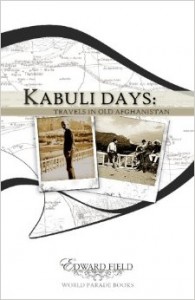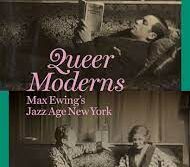 Kabuli Days: Travels in Old Afghanistan
Kabuli Days: Travels in Old Afghanistan
by Edward Field
World Parade Books. 148 pages, $15.
IN 1971, the poet Edward Field did the unimaginable: he bought a ticket to Afghanistan, inspired mainly by a photograph he had seen in a National Geographic. He was almost fifty years old, an age when most men aren’t looking for a travel experience involving hotel rooms without water, landscapes thick with the smell of human and animal waste, and local police who tend to regard you as a potential criminal.
But the ever adventurous Field put his fears aside and embarked on a trip that produced Kabuli Days: Travels in Old Afghanistan, one of the most interesting travel diaries I’ve read. For a Jewish gay man to commit to spending a year in a rural Muslim environment took a lot of courage. In 1971, for Westerners the Islamic world was still a place of romance: Lawrence of Arabia and Kahlil Gibran’s “The Prophet,” bejeweled women dancing in harems, and dashing sheiks racing on camels—the stuff of poetry and dreams.
From the moment his journey begins, Field’s days become a labyrinth of challenges. He learns from a Pakistani that Christians are considered dirty by Muslims and decides against telling her that he’s Jewish. He decides to pass for “Christian” and, mysteriously, is never questioned further. He’s not there to prove a point, after all; he’s open to most anything that comes along. When asked by a group of farmers to pray with them, he complies with the sincerity of a convert, repeating the name of Allah. The sight of scores of roughhewn men simultaneously bowing their bodies in prayer strikes him as “beautiful,” but his poet’s eye notices that during the pre-prayer ritual, the men squat to pee, “which makes it quite a private act, though difficult with those flowing native clothes; then washing hands, feet, nose, ears, and mouth … and finally the kneeling and bowing exercises that go with the prayers.” In the countryside, he observes stark naked dervishes, or holy men, with their cocks and balls exposed sitting under trees. In another instance, he becomes protective of a female French tourist and discovers that were she to go out alone at night any man would have the legal right to “seize” her. The Afghan romance begins to dim somewhat, especially in areas of eating and drinking, when he finds that meticulous attention must be paid to the water. Even bathing in certain rivers can invite incubating bugs and the onset of diarrhea. In Kabuli, as in all of Afghanistan, there may be no roadside bars or cafés, but as an alternative to a glass of Merlot or Chardonnay, there’s plenty of hashish to be had. Unsurprisingly, he winds up smoking a lot of hashish with strangers who invite him into their homes for tea or melons. Nevertheless, he confesses that drugs “befuddle the mind. It’s like being hit over the head.” While he attempts to limit his intake of hashish—he writes that it makes him feel vulnerable around strangers—he’s open to acquiring opium, if it’s available. Melons play a big part in this Afghanistan journey. It seems everyone is either carrying a melon or slicing one in two. Field’s dinners include yogurt and melons with random samplings of chicken. But in the end he’s not a great eater. How he gets by so long on so little food is a mystery, which he explains by saying that he has a sensitive stomach. He meets some American hippies “who make no attempt to learn any of the languages,” while Field himself tries to master Farsi. Later, he will purchase a turban and authentic Afghan dress, but it takes him a while to feel comfortable wearing it in public. He detects sensuality in this new land, but this does little to erode his feelings of frustration. At the local post office he’s invited by the postmaster to sit down and chat. “He was wearing striped pajamas and holding his prick—so the men do touch themselves in this country, but I still get very little sensual feeling from them. Another thing, I talk and talk with them but never feel I’ve made a friend. Is sexuality out because of my age? In Iran I certainly didn’t feel any such thing. Here, I’m not sure where the sexuality is.” Field finds Afghan men handsome and longs for a special friend or a comrade-in-arms, but when opportunities present themselves he’s not in the mood. At one point a buggy driver offers him a teenage boy, but he lets the offer go unanswered. Another time, while sleeping on a shared bedroll, a handsome soccer player puts one foot on his and “tugs at my pants to pull me towards him.” Field, however, does not respond. When two twenty-something student tourists make it obvious that they want to spend more time with him, he mysteriously declines, then regrets his decision the moment they leave his hotel room. When a boy of twenty is attracted to him and they have an “intimate conversation of the eyes,” Field does manage to get his address, but that’s all. “How I wish he were going my way,” he laments, later admitting, “I’ve made no real friends here and it’s my own fault. And with all my frantic searching and bargaining, I didn’t buy any rugs. I didn’t live in the part of town I love. I never got laid or found a lover. I only scribbled in this diary, and felt foolish.” Luckily for the diarist, he seems to have had an endless supply of money, so he’s able to shell out cash when hotel proprietors and others overcharge him. Despite his fears of getting robbed, that does not happen. There’s a fascinating description of the poet’s visit to Bamian Valley, or the Grand Canyon of the giant Buddhas where the Taliban blew up the two colossi ten years ago. Field climbs the hill “to the head of the great Buddha, sitting down to rest in the shade of some caves with smoke-blackened roofs.” The rock, he says, “is cut in a smooth arc over the Buddha’s head, framing a postcard view of the valley.” Scouting through the nooks and crannies, he discovers a family living in the caves behind the great statues. Field may have felt foolish for not getting laid or buying a new rug, but this is not a foolish odyssey. As a portrait of pre-Iraq war Afghanistan, Kabuli Days becomes something else: a serious look into a culture where customs and social values are so unlike our own. How Field navigates this landmine is a testament to his ingenuity as a lonesome traveler. Thom Nickels’ books include Philadelphia Architecture, Tropic of Libra and Out in History. His novel Spore will be published in June 2010.





